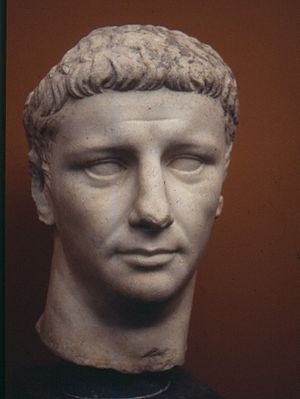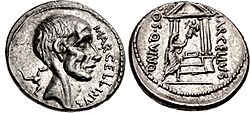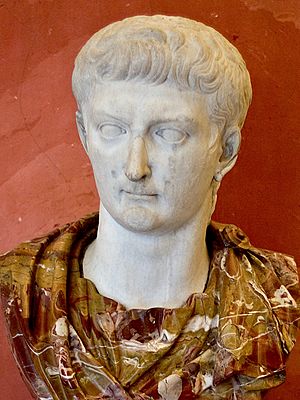Claudia gens facts for kids
The Claudian family (known as gens Claudia in Latin) was one of the most important and powerful families in ancient Rome. They were a "patrician" family, meaning they belonged to the oldest and most noble Roman families. Their history goes all the way back to the very beginning of the Roman Republic.
The first Claudius to become a consul (a top leader) was Appius Claudius Sabinus Regillensis in 495 BC. From then on, members of the Claudian family often held the highest positions in Rome, both during the Republic and later during the Roman Empire.
Some Claudii were "plebeians," meaning they were common citizens, not nobles. These plebeian Claudii might have been descendants of family members who chose to become plebeians, or perhaps freed slaves of the family. Later, a patrician Claudius named Publius Clodius Pulcher even chose to become a plebeian and changed his name's spelling to "Clodius."
The historian Suetonius wrote about the Claudian family in his book about Emperor Tiberius, who was a Claudius. Suetonius noted that the family had many achievements, including "twenty-eight consulships, five dictatorships, seven censorships, six triumphs, and two ovations." He also mentioned both the good and bad things done by family members.
The noble Claudii were known for being very proud and sometimes arrogant. They often disagreed with the common people. During the Republic, no noble Claudius adopted someone from another family. Emperor Claudius was the first to break this tradition when he adopted Lucius Domitius Ahenobarbus, who later became Emperor Nero.
Contents
Where the Claudian Family Came From
According to old stories, the first Claudius was a man named Attius Clausus from the Sabines, a neighboring people. He came to Rome with his followers in 504 BC, during the early years of the Republic. At that time, Rome was often fighting the Sabines. Clausus wanted to end the fighting. When his efforts failed, he moved to Rome. He brought about five hundred men who could fight, according to the historian Dionysius of Halicarnassus.
Clausus changed his Sabine name to the Latin name Appius Claudius. He became a Roman noble and was given a seat in the Senate. He quickly became one of its most important members. His family was given a special burial place near the Capitoline Hill. His followers received land near the Anio River, forming the "Old Claudian" tribe.
Emperor Claudius once spoke about these traditions in the Senate. He used his family's story to argue that people with great talent should be allowed to join the Senate, no matter where they came from. The poet Virgil even wrote about Attius Clausus in his famous poem, the Aeneid. Virgil made Clausus live at the same time as the legendary hero Aeneas, showing how important the Claudian family was.
The family name Claudius (originally Clausus) might come from the Latin word claudus, meaning "lame." However, there are no stories that any early Claudii were lame. So, the name might have another meaning, or it could have been a nickname. The change from Clausus to Claudius and Clodius shows how words from Sabine origins sometimes changed in Latin.
Family Names and Nicknames
The noble Claudii used several surnames, like Caecus, Caudex, Centho, Crassus, Nero, Pulcher, Regillensis, and Sabinus. The last two were often used for the whole family but were less common when a more specific surname was available. Some noble Claudii are mentioned without any surname.
The plebeian Claudii used surnames such as Asellus, Canina, Centumalus, Cicero, Flamen, Glaber, and Marcellus.
The earliest Claudii used the surname Sabinus. This was a common name for someone from the Sabine region or of Sabine descent, which the Claudii were. This surname was first used by Appius Claudius, the family founder. His descendants kept it until it was replaced by Crassus.
Regillensis was another early surname. It came from the town of Regillum, a Sabine settlement where Appius Claudius lived before coming to Rome. Its exact location is not known. The same surname was used by a family of the Postumii, but for them, it came from the Battle of Lake Regillus.
Crassus was a common surname meaning "thick" or "dull." This name became the main surname for the Claudian family after Sabinus. Members of the family used it from the 400s BC to the 200s BC. Appius Claudius Caecus was the last known Claudius Crassus. His four sons started new branches of the family with different surnames: Russus (or Rufus), Pulcher, Cento (or Centho), and Nero.
Pulcher means "beautiful." This was the surname of another major branch of the Claudian family. It might have been given as a joke. The Claudii Pulchri were a large family. They provided Rome with several consuls and continued to be important into imperial times.

Another important branch of the noble Claudii used the surname Nero. This was originally a Sabine first name meaning "strong and sturdy." This family was very important during the late Republic. Several early emperors came from this family, including Tiberius, Claudius, and Nero. It's interesting that these emperors are known by different types of names: Tiberius by a first name, Claudius by a family name, and Nero by a surname.
The most famous family of the plebeian Claudii used the surname Marcellus. This name is a smaller version of the first name Marcus. They became famous because of Marcus Claudius Marcellus, one of Rome's best generals. He was a key figure in the Second Punic War. He was consul five times and won the spolia opima (a special honor) by defeating and killing the Gallic king, Viridomarus, in a one-on-one fight.
Most people who spelled their name Clodius were from the plebeian side of the family. However, one family named Clodius was a branch of the noble Claudii Pulchri. They chose to become plebeians and used the spelling Clodius to show they were different from their noble relatives.
Caecus was a surname meaning "blind." It referred to Appius Claudius Caecus who became blind later in his life. His initial surname was Crassus.
Caecus' brother, who had the same first name, was known by the surname Caudex. This word literally means "tree trunk." It could also be used as an insult, meaning "dolt." According to Seneca, he got this name because he was very interested in naval affairs.
Notable Claudian Family Members
The Claudian family had many important members throughout Roman history. Here are some of the most well-known:
Claudii Sabini and Crassi
- Appius Claudius Sabinus Regillensis: The founder of the Claudian family in Rome. He was consul in 495 BC.
- Appius Claudius Crassus (Decemvir): A leader in the mid-400s BC. He was part of a group that wrote down Rome's laws.
- Appius Claudius Caecus: A censor in 312 BC and consul twice. He was known for building the first Roman aqueduct (a water channel) and a major road, the Appian Way. He also supported some reforms for the common people.
- Appius Claudius Caudex: Consul in 264 BC. He led Roman forces in Sicily at the start of the First Punic War.
Claudii Pulchri
- Publius Claudius Pulcher (consul 249 BC): Consul in 249 BC. He lost a major naval battle against Carthage because he ignored bad omens.
- Appius Claudius Pulcher (consul 212 BC): Consul in 212 BC during the Second Punic War. He fought against Hannibal and was fatally wounded.
- Claudia Quinta: A famous woman who helped bring a sacred image of the goddess Cybele to Rome.
- Appius Claudius Pulcher (consul 54 BC): Consul in 54 BC and censor in 50 BC.
- Publius Clodius Pulcher: A very influential and controversial politician in the late Republic. He was known for his strong support of the common people.
- Claudia (wife of Octavian): Daughter of Publius Clodius Pulcher and the first wife of Octavian, who later became Emperor Augustus.
- Claudia Pulchra: A noblewoman who faced serious accusations during the reign of Tiberius.
Claudii Centhones
- Gaius Claudius Centho: Consul in 240 BC and dictator in 213 BC.
- Appius Claudius Centho: Praetor in 175 BC. He defeated the Celtiberians in Spain.
Claudii Nerones
- Gaius Claudius Nero: Consul in 207 BC. He and his fellow consul won a major victory against Hasdrubal (Barcid) at the Battle of the Metaurus during the Second Punic War.
- Tiberius Claudius Nero (father of Tiberius Caesar): The father of the future Emperor Tiberius.
- Tiberius Claudius Nero: The second Roman emperor, adopted by Augustus.
- Nero Claudius Drusus: Brother of Tiberius and a successful general. He was the father of Emperor Claudius.
- Nero Claudius Drusus Germanicus: A popular general and nephew of Tiberius.
- Tiberius Claudius Drusus: The fourth Roman emperor, known for expanding the empire and improving Roman law.
- Nero Claudius Caesar Drusus Germanicus: The fifth Roman emperor, adopted by Claudius.
Claudii Marcelli

- Marcus Claudius Marcellus: A great general during the Second Punic War. He was consul five times and famous for capturing Syracuse.
- Marcus Claudius Marcellus (consul 166 BC): Consul three times. He won victories against the Gauls and Ligures.
- Marcus Claudius Marcellus (consul 51 BC): Consul in 51 BC and a respected speaker.
- Gaius Claudius Marcellus (consul 50 BC): Consul in 50 BC. He supported Pompey during the Civil War but later received Caesar's pardon.
- Marcus Claudius Marcellus (nephew of Augustus): Nephew of Emperor Augustus and his chosen heir. He died young.
Other Notable Claudii
- Marcus Claudius Glicia: A man from a freedman family who was briefly named dictator in 249 BC.
- Quintus Claudius Quadrigarius: A Roman historian from the early 1st century BC.
- Tiberius Claudius Thrasyllus: A Greek Egyptian astrologer and friend of Emperor Tiberius.
- Tiberius Claudius Narcissus: A freedman who became an important advisor to Emperor Claudius.
- Claudius Civilis: A leader of the Batavi people who led a revolt against Rome in AD 69.
- Claudius Ptolemaeus: A famous Greek mathematician and astronomer of the 2nd century AD.
- Tiberius Claudius Atticus Herodes: A celebrated speaker and consul in AD 143.
- Marcus Aurelius Claudius "Gothicus": Roman emperor from AD 268 to 270.
- Marcus Claudius Tacitus: Roman emperor from AD 275 to 276.
- Claudius Claudianus: A famous Latin poet who lived in the late 300s and early 400s AD.
Images for kids
-
Denarius of Publius Cornelius Lentulus Marcellinus, 50 BC, honouring his ancestor Claudius Marcellus, portrayed on the obverse. The triskeles behind his head alludes to his capture of Syracuse in 212 BC. The reverse shows him putting his spolia opima into a temple. The legend COS QVINQ refers to his five consulships.
See also
 In Spanish: Gens Claudia para niños
In Spanish: Gens Claudia para niños
- List of Roman gentes
- Julio-Claudian dynasty
- List of Roman consuls
 | Selma Burke |
 | Pauline Powell Burns |
 | Frederick J. Brown |
 | Robert Blackburn |



